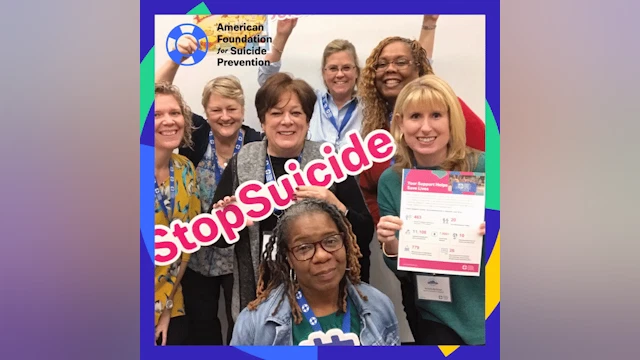
I couldn’t contain my excitement getting ready for the American Foundation for Suicide Prevention’s 2022 Chapter Leadership Conference held in Houston, Texas on March 31. The Chapter Leadership Conference is an annual event bringing together chapter volunteer leaders and staff from across the country to acknowledge our accomplishments and learn more about moving our mission forward.
Appropriately titled, Together, We Can Help Stop Suicide, this year’s event hosted 325 in-person attendees and over 100 online participants representing local chapters from across the country. To be honest, it was hard to remember the last time we were all together in person like this. Wait…it was January 2020. This time around felt more important to be together than any other time in the past. Being together is just what we did!
We jumped in like we never missed a beat after Thursday’s ‘pre-conference’ activities for Chapter Chairs and Walk Chairs. Mike Lamma, AFSP Senior Vice President for Development & Field Management, started us off Friday morning with the Opening Ceremony and a moving Chapter Roll Call as those in attendance waited for their chapter to be recognized. Heather Lottering, the board chair of AFSP’s Southeast Texas chapter and I shared our welcoming remarks as well, noting the importance of finally being together post-pandemic.
After some remarks from AFSP’s Chairman of the Board, Jim Compton, who spoke of his own loss experience and how the loneliness of that experience was dispelled thanks to the AFSP community, we heard from CEO Bob Gebbia as he delivered his leadership message outlining the strategic planning currently underway, as well as commenting on the strength of our volunteers: “Without you, there is no AFSP.”
Members of the Chapter Leadership Council then delivered a plenary presentation highlighting volunteer engagement, board term limits and succession planning. I was joined by Council members Ali Walker, Chair of the National Capital Area Chapter (named the overall Chapter of the year), and Denis Lasley, immediate past chair of the Arkansas chapter. The session emphasized the importance of creating a functioning Nominations Committee and the need for board member self-assessment as necessary for successful board health. This process-focused session would prepare chapters to keep pace with creating more diverse and inclusive boards as well as improving chapter sustainability.
Attendees were inspired by the personal story of Doug Middleton, mental health advocate and veteran NFL safety as he delivered the keynote address: “There is Pain That Uses You and Pain You Use.” This incredibly meaningful session brought many in the audience to tears as Doug shared his impactful story of losing his best friend to suicide and the pain that inspired him to re-focus his life and share this experience with others who might be struggling in silence. His message reminds us all that we are more connected in our shared experience of pain and loss.
AFSP’s Chief Medical Officer, Dr. Christine Moutier, shared her presentation “A Message of Hope” in regard to suicide prevention efforts in the post-pandemic space, sharing that there are many silver linings as we come out of the COVID-19 pandemic and into a phase of recovery and healing. Culturally, people have become much more attuned to the importance of mental health. Much is happening to help expand our efforts as outside partnerships and collaborations with organizations like CVS/Aetna and Netflix allow for a greater impact of our mission: to save lives and bring hope to those affected by suicide.
One of the highlights of this weekend’s programming was to see AFSP’s Project 2025 team present their updates in a presentation entitled “Project 2025 Level Up: Ready. Set. Grow.” Our P25 Team really delivered on a past promise to bring tools and resources to chapters on how we can meet the bold goal of decreasing the suicide rate 20% by 2025. With P25’s focus in the areas of healthcare systems, emergency departments, firearms, and corrections, there is renewed hope that we are moving in the right direction. I saw first-hand the energy and passion this dynamic team of Renee Cruz, AFSP VP Project 2025; Ryan Price, Senior Manager, Project 2025; Tandra Rutledge, Director, Healthcare Systems Initiatives, Project 2025; Corbin Standley, Director of Strategic Program Planning has brought to this project endeavor. The partnership the P25 Team has extended to our chapter network is compounding the project’s effort and reach.
Between the awesome plenary sessions and updates, there were many breakout sessions offered for those in attendance to choose from. It was hard to decide which session to attend, as AFSP staff and chapter leaders teamed up to offer updates on “Impact Measurement,” “Creative and Big ideas in Corporate Partnerships” and “Engaging & Supporting Loss Survivors through Programming.”
Saturday night’s Chapter Awards Banquet provided an opportunity to celebrate all the hard work being done by chapters across the country at the community level in the areas of prevention education, loss and healing programming, and advocacy. We celebrated our hard work and accomplishments as awards for top chapter fundraising events and programs were presented. As incredible as it is to receive an award, there’s something really impactful about being able to experience the energy and gratitude we all feel for each other and the mission we serve.
The conference concluded on Sunday morning with a program focused on self-care. While the conference planners have historically offered programming on self-care at previous Chapter Leadership Conferences, this year’s program was more important than ever before. We all arrived in Houston excited to celebrate our individual and combined organizational successes; and with the residual impacts of the pandemic still lingering for many of us, we embraced being together more deeply than I can remember. We all have much to do moving forward back home in our communities to decrease the impact of suicide. One thing is for certain: we left this powerful conference with a renewed belief that Together, We Can Help Stop Suicide.
